From the streets of Paris to the beaches of Nice, from Quebec to Senegal, French speakers have a delightful array of ways to bid each other sweet dreams. Whether you're tucking in les enfants, saying au revoir to your date, or wrapping up a business call, there's a perfect French phrase for every nighttime scenario.
In this guide, we'll explore everything from classic goodnights to regional variations, from formal farewells to playful Gen Z texting sign-offs. You'll learn how to:
-
Navigate the tricky waters of "bonne nuit" vs. "bonsoir"
-
Charm your way through romantic evening goodbyes
-
Tuck in the kids with the coziest of French phrases
-
Impress your boss with a polite and professional nighttime farewell
-
Text good night in french like a true French teen (emojis included!)
But wait, there's more! We'll also peek into some bedtime traditions that'll make you feel like you've been whisked away to a charming French household. And for those of you who love a good cultural tidbit, we've got some nighttime superstitions and sayings that'll be sure to impress your French friends.
When is "Goodnight" used in French and its usage depending on context and scenario
First things first: "Bonne nuit" is your go-to French phrase for "goodnight," but here's the catch – you only use it when someone is actually going to bed.
It's like saying, "Sleep tight, don't let the bed bugs bite!"
If you're leaving a party at 9 PM and everyone's still going strong, saying "bonne nuit" might get you some weird looks.
So what do you say when you're leaving in the evening? That's where "Bonsoir" comes in. It means "good evening," but it's also used as a farewell in the evening hours. It's perfect for when you're heading out of a restaurant, leaving work, or saying goodbye to friends after a night out.
“But when should I transition from, “Bonsoir” to “Bonne nuit,” I hear you ask.
Well, in France, the switch from "Bonsoir" to "Bonne nuit" usually happens later than you might think. We're talking 11 PM or even midnight. Before then, stick with "Bonsoir" unless you know the person is heading straight to bed.
Context matters too. If you're staying at someone's house and heading to your room for the night, that's a "Bonne nuit" situation.
But if you're leaving their house to go home, even if it's late, "Bonsoir" is often more appropriate.
And here's a little cultural tidbit: the French aren't big on saying goodnight to everyone in a group. If you're at a gathering and people start to leave, don't be surprised if they just slip out with a general "Au revoir" to the room. It's not rude; it's just how it's done.
Lastly, remember that tone and relationship play a part too. "Bonne nuit" can be warm and intimate when said to family or a partner, but keep it neutral with people you don't know well. You don't want to accidentally sound too cozy with your boss!
How do you say goodnight in French in 75 ways?
Whether you're tucking in the kids, saying goodbye to your date, or closing a formal event, we've got you covered. Let's explore the many ways to say goodnight in French, from the everyday to the extra fancy.
Standard ways to say good night in French
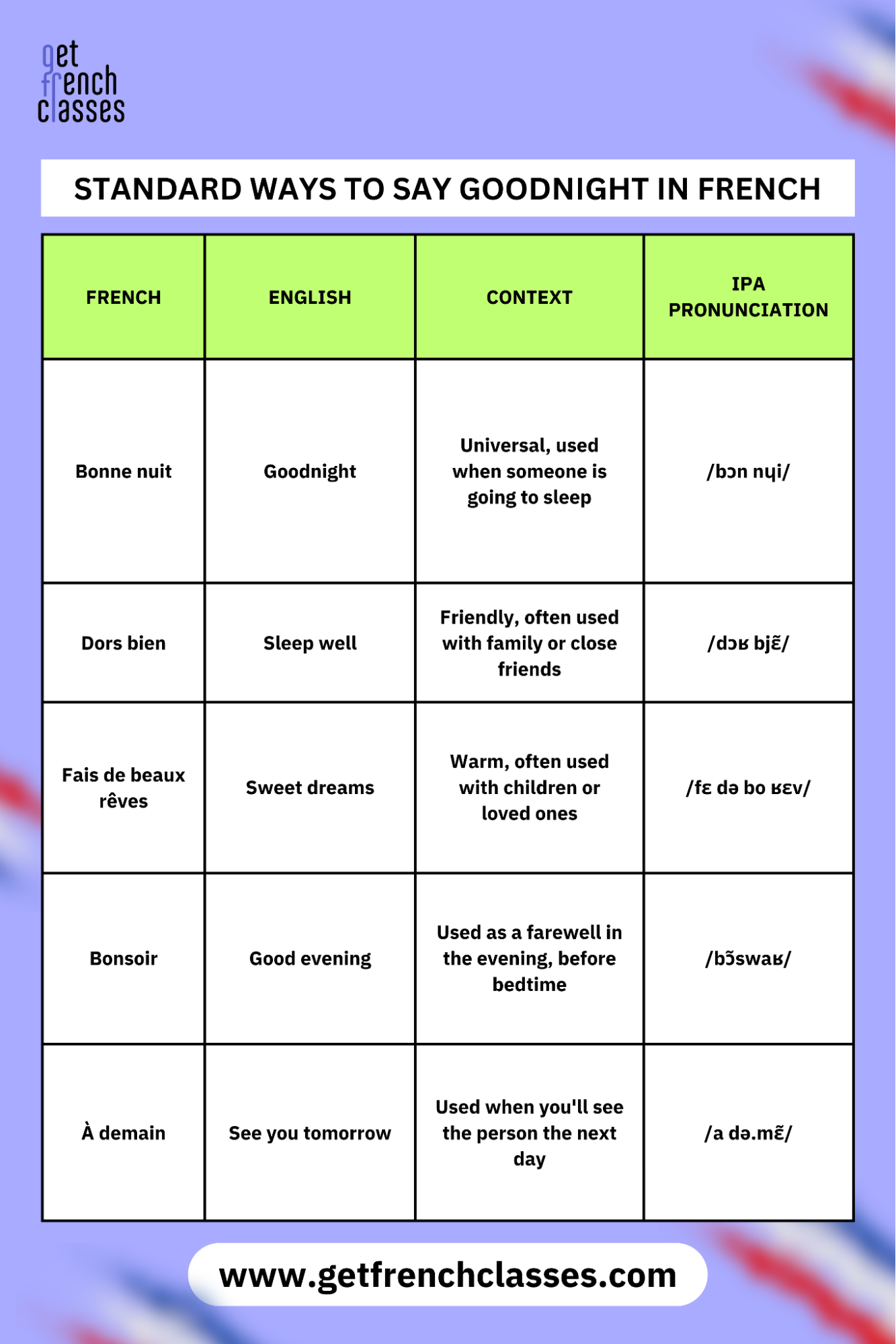
These are your bread-and-butter goodnight phrases. Master these, and you'll never be caught tongue-tied at bedtime in France.
| French | English | Context | IPA Pronunciation |
|---|---|---|---|
| Bonne nuit | Goodnight | Universal, used when someone is going to sleep | /bɔn nɥi/ |
| Dors bien | Sleep well | Friendly, often used with family or close friends | /dɔʁ bjɛ̃/ |
| Fais de beaux rêves | Sweet dreams | Warm, often used with children or loved ones | /fɛ də bo ʁɛv/ |
| Bonsoir | Good evening | Used as a farewell in the evening, before bedtime | /bɔ̃swaʁ/ |
| À demain | See you tomorrow | Used when you'll see the person the next day | /a də.mɛ̃/ |
Examples and explanations of nuances:
-
At a house party ending late: " Bon, il est tard. Bonsoir tout le monde ! Well, it's late. Good evening everyone! Nuance : Here, even though it's late, "Bonsoir" is used instead of "Bonne nuit" because people aren't necessarily going to bed right away. It's a polite way to say you're leaving.
-
Tucking in your child: " Bonne nuit, mon chéri. Fais de beaux rêves. Goodnight, my darling. Sweet dreams. ) Nuance : Combining "Bonne nuit" with "Fais de beaux rêves" adds warmth and affection, perfect for a bedtime ritual with kids.
"Bonne nuit, les petits." (which reads, "bɔn nɥi, le pəti," and means Children good night.)
-
Saying goodbye to a colleague after a late meeting: " Merci pour votre travail. Bonne soirée et à demain. Thanks for your work. Have a good evening and see you tomorrow. ) Nuance : In a professional context, "Bonne soirée" (Have a good evening) is often preferred over "Bonne nuit," which might sound too intimate. Adding "à demain" confirms you'll see them at work the next day.
-
Ending a phone call with a friend late at night: "Allez, je te laisse dormir. Bonne nuit, dors bien !" ( Alright, I'll let you sleep. Goodnight, sleep well! ) Nuance : "Dors bien" adds a friendly touch to "Bonne nuit," showing you care about your friend's rest without being overly intimate.
-
At a hotel: Concierge : " Bonne nuit, Monsieur. Dormez bien. ( Goodnight, Sir. Sleep well. ) Nuance : In a service context, adding "Dormez bien" to "Bonne nuit" strikes a balance between politeness and warmth without overstepping professional boundaries.
In this fifth case, you could also say "Passe une bonne soirée!" (reads, " pas ynə bɔnə swaɾeə" and literally means Have a good night!) It's more polite and formal.
Eg: When leaving work late before going home, you can tell your boss who is still with you "Passez une bonne nuit, Monsieur! ( Have a good night, Sir)
Remember, the key to mastering these phrases is understanding the context. "Bonne nuit" is reserved for when someone's actually going to bed, while "Bonsoir" or "Bonne soirée" or "Passe une bonne soirée" work better as evening farewells.
And don't forget, the French often use these phrases with "Monsieur," "Madame," or someone's name to add an extra touch of politeness or personalization!
Casual and informal ways to say sweet dreams in French
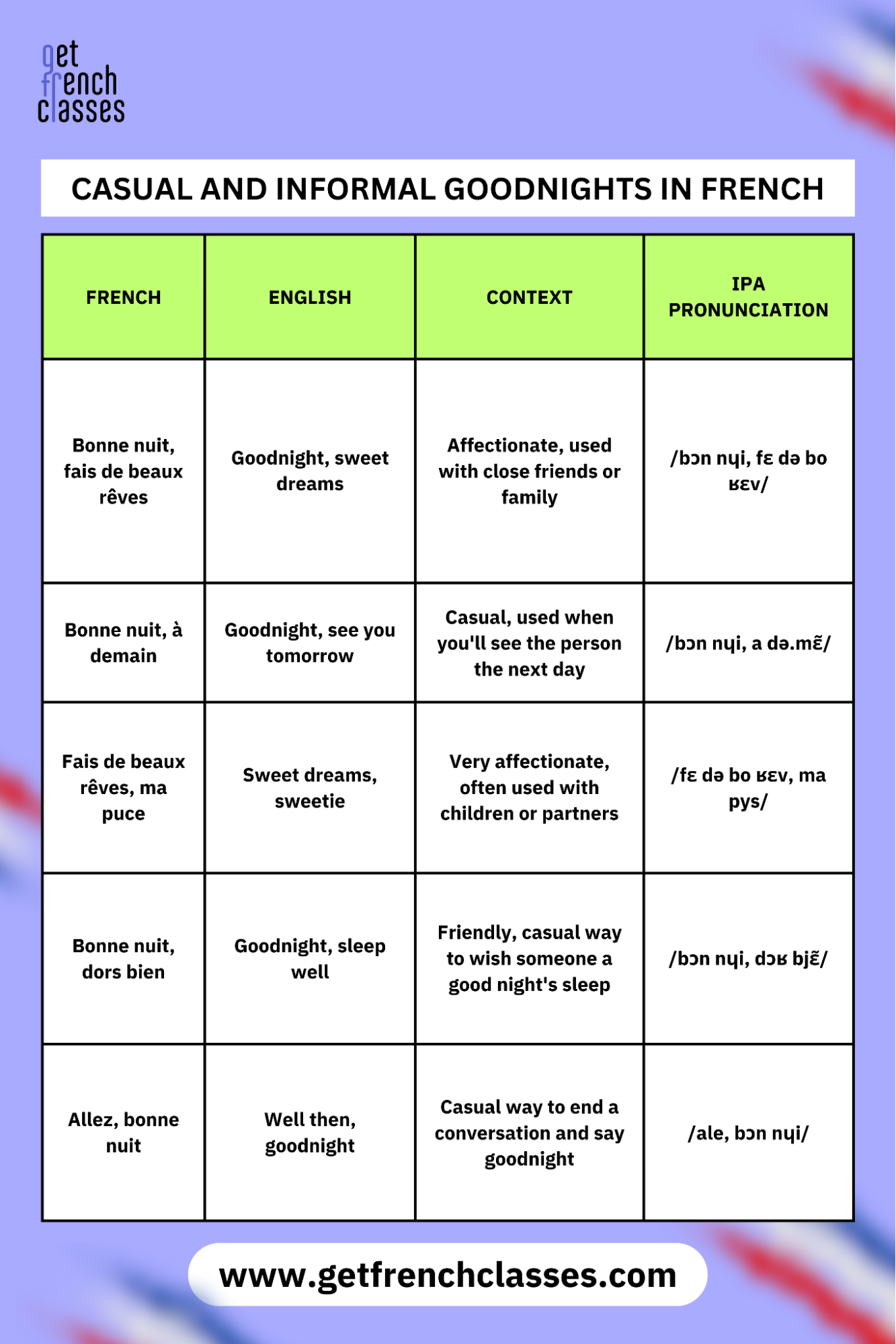
Alright, let's get cozy with some laid-back ways to say good night in French. These are perfect for friends, family, or anytime you want to keep things chill.
| French | English | Context | IPA Pronunciation |
|---|---|---|---|
| Bonne nuit, fais de beaux rêves | Goodnight, sweet dreams | Affectionate, used with close friends or family | /bɔn nɥi, fɛ də bo ʁɛv/ |
| Bonne nuit, à demain | Goodnight, see you tomorrow | Casual, used when you'll see the person the next day | /bɔn nɥi, a də.mɛ̃/ |
| Fais de beaux rêves, ma puce | Sweet dreams, sweetie | Very affectionate, often used with children or partners | /fɛ də bo ʁɛv, ma pys/ |
| Bonne nuit, dors bien | Goodnight, sleep well | Friendly, casual way to wish someone a good night's sleep | /bɔn nɥi, dɔʁ bjɛ̃/ |
| Allez, bonne nuit | Well then, goodnight | Casual way to end a conversation and say goodnight | /ale, bɔn nɥi/ |
-
Texting your bestie before bed: Allez, je vais dormir. Je dois me lever tôt demain. Bonne nuit, fais de beaux rêves ! 😴💤 Well, I'm off to sleep. I have to wake up early tomorrow. Goodnight, sweet dreams! 😴💤 Adding emojis in texts is super common in casual French texting. The "Allez" at the beginning is a typical way to transition, kind of like saying "Right then" in English.
-
Saying good night in French to your roommate: J'y vais, bonne nuit, à demain pour le petit-dej ! I'm off, goodnight, see you tomorrow for breakfast! "J'y vais" (literally "I'm going there") is a common way to say you're leaving or going to bed. "Petit-dej" is a casual shortening of "petit-déjeuner" (breakfast).
-
A parent tucking in their child: Allez, c'est l'heure de dormir. Fais de beaux rêves, ma puce. Bonne nuit, je t'aime. Come on, it's time to sleep. Sweet dreams, sweetie. I love you. "Ma puce" (literally "my flea") is a common term of endearment in French, especially for children. It's sweet, not weird!
-
Ending a late-night call with your partner: Bon, il est tard. Bonne nuit, mon cœur, dors bien. Well, it's late. Goodnight, my heart, sleep well. "Mon cœur" is a sweet way to say "my love" in French. Adding "dors bien" at the end shows extra care.
-
At a sleepover with friends: Ok les gars, je suis crevé. Allez, bonne nuit tout le monde ! Okay guys, I'm beat. Well then, goodnight everyone! "Je suis crevé" is a very casual way to say "I'm exhausted." "Les gars" is an informal way to address a group of friends, regardless of gender.
Remember, in casual settings, it's all about the tone and the little add-ons. Throwing in a "Allez" or ending with a "Bisous" (kisses) can make your goodnight super French and super friendly. And don't be shy about using terms of endearment with close friends – the French love their pet names!
Formal and polite goodnight expressions in French other than passez une bonne nuit
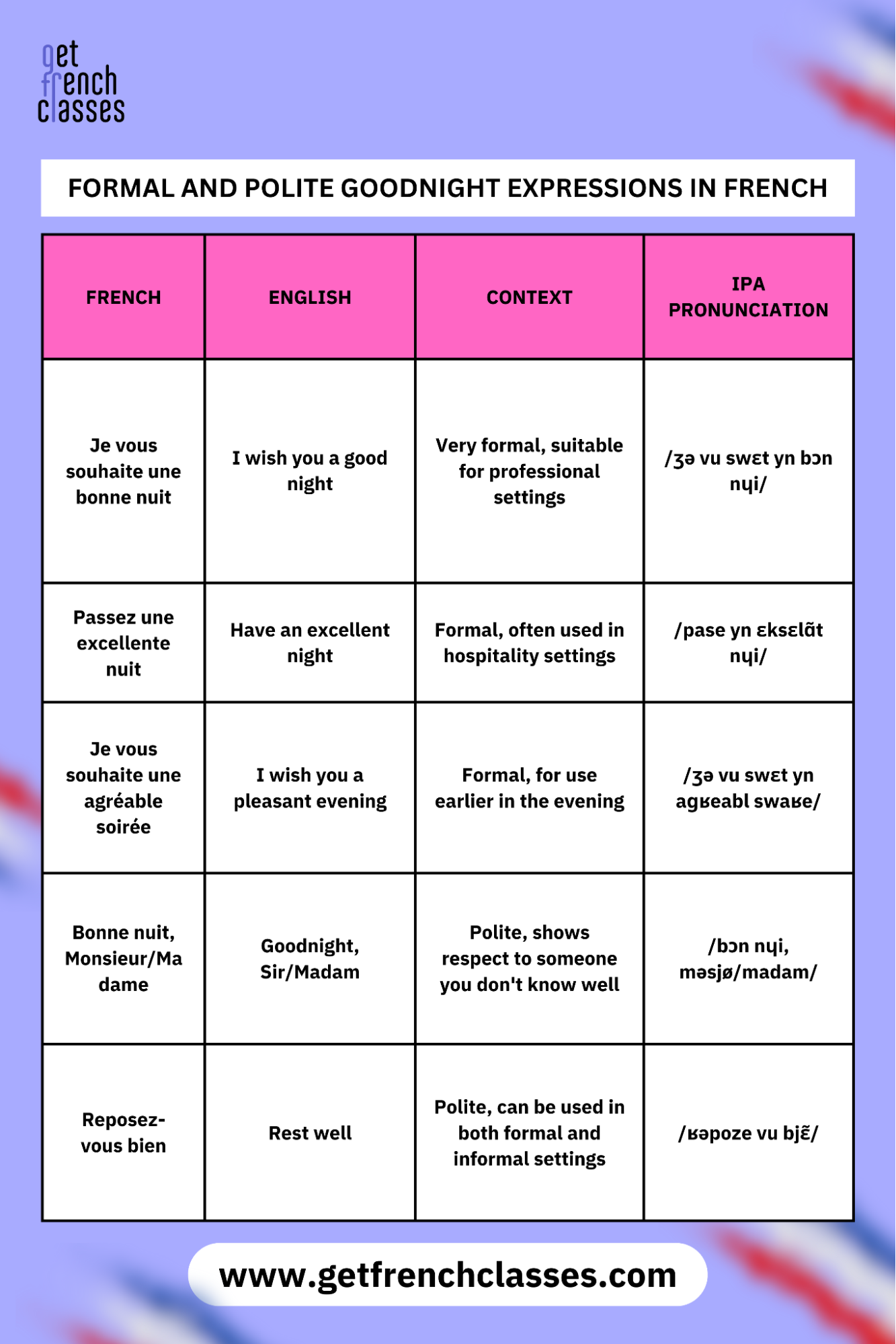
Time to class things up a bit! These formal and polite good night expressions are perfect for professional settings, speaking with elders, or anytime you want to show extra respect. Let's dive in!
| French | English | Context | IPA Pronunciation |
|---|---|---|---|
| Je vous souhaite une bonne nuit | I wish you a good night | Very formal, suitable for professional settings | /ʒə vu swɛt yn bɔn nɥi/ |
| Passez une excellente nuit | Have an excellent night | Formal, often used in hospitality settings | /pase yn ɛksɛlɑ̃t nɥi/ |
| Je vous souhaite une agréable soirée | I wish you a pleasant evening | Formal, for use earlier in the evening | /ʒə vu swɛt yn aɡʁeabl swaʁe/ |
| Bonne nuit, Monsieur/Madame | Goodnight, Sir/Madam | Polite, shows respect to someone you don't know well | /bɔn nɥi, məsjø/madam/ |
| Reposez-vous bien | Rest well | Polite, can be used in both formal and informal settings | /ʁəpoze vu bjɛ̃/ |
-
At the end of a business dinner: Merci pour cette agréable soirée. Je vous souhaite une bonne nuit, à bientôt. Thank you for this pleasant evening. I wish you a good night, see you soon. Using "Je vous souhaite" adds an extra layer of formality and politeness. The "à bientôt" at the end keeps it professional while hinting at future interactions.
-
A hotel concierge to a guest: Passez une excellente nuit, Madame. N'hésitez pas à nous contacter si vous avez besoin de quoi que ce soit. Have an excellent night, Madam. Don't hesitate to contact us if you need anything. In hospitality, it's common to add an offer of service after the goodnight wish. The use of "Madame" maintains professionalism.
-
Leaving a formal event early: Je dois malheureusement vous quitter. Je suis épuisé. Je vous souhaite une agréable soirée. I unfortunately must leave you. I wish you a pleasant evening. Using "Je dois malheureusement vous quitter" is a polite way to announce your departure. "Agréable soirée" is used here as it's earlier in the evening.
-
To an elderly neighbor: Bonne nuit, Madame Dubois. Reposez-vous bien. Goodnight, Mrs. Dubois. Rest well. Using the person's name with "Madame" shows respect. "Reposez-vous bien" is a thoughtful addition, especially for an older person.
-
At the end of a late work call: " Merci pour votre travail. Je vous souhaite une bonne nuit et à demain. " ( Thank you for your work. I wish you a good night and see you tomorrow. ) This combines gratitude, a formal goodnight wish, and a reference to the next workday, keeping it professional yet friendly.
Remember, in formal settings, it's all about showing respect and maintaining a bit of distance. Using "vous" instead of "tu" is crucial. Also, don't be afraid to extend your goodnight wishes with additional polite phrases – the French appreciate when you take the time to be courteous!
Romantic ways to say goodnight in French
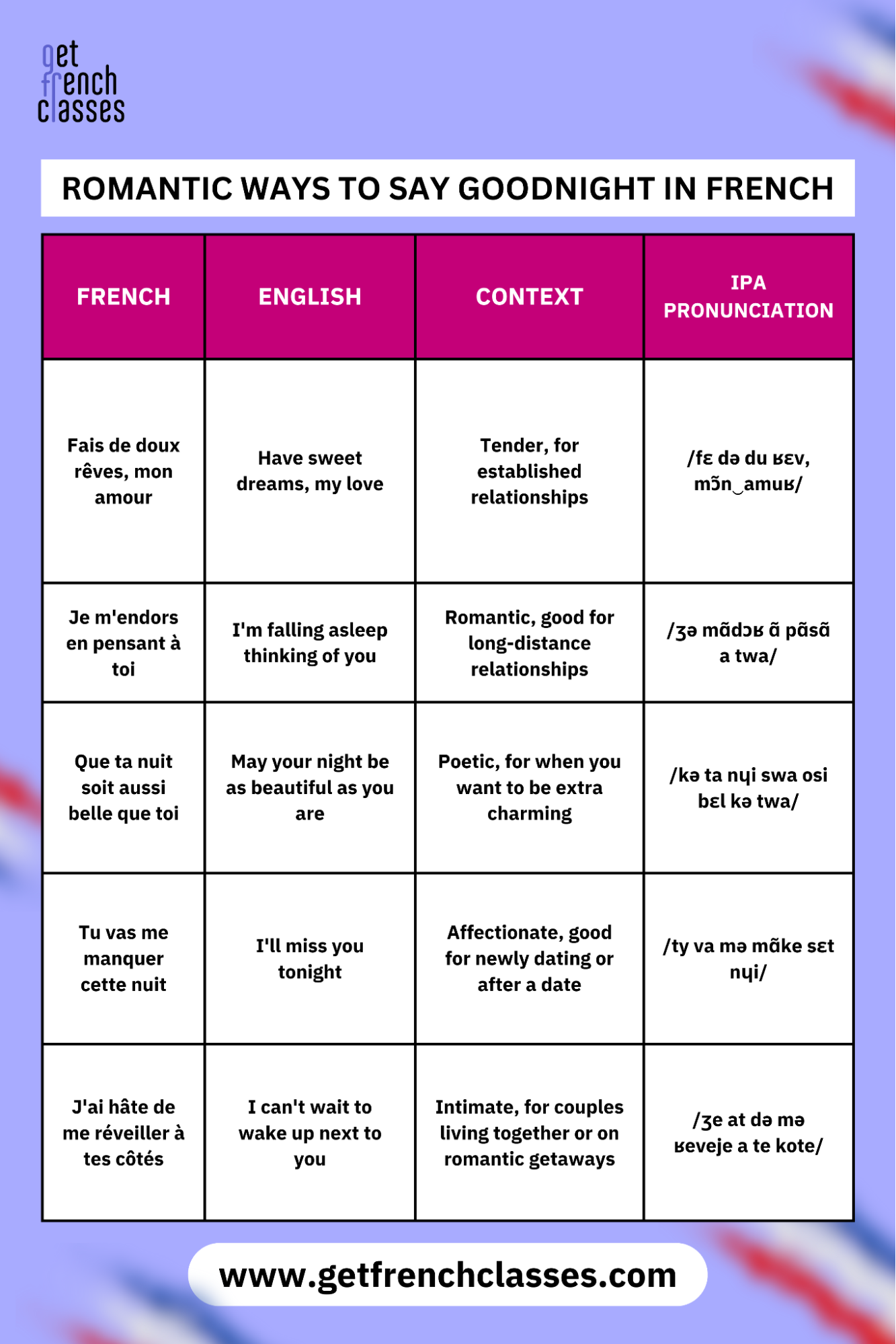
Ready to turn up the charm? These romantic ways to say good night in french are perfect for that special someone. From sweet and tender to passionate and poetic, we've got you covered. Let's dive into the language of love!
| French | English | Context | IPA Pronunciation |
|---|---|---|---|
| Fais de doux rêves, mon amour | Have sweet dreams, my love | Tender, for established relationships | /fɛ də du ʁɛv, mɔ̃n‿amuʁ/ |
| Je m'endors en pensant à toi | I'm falling asleep thinking of you | Romantic, good for long-distance relationships | /ʒə mɑ̃dɔʁ ɑ̃ pɑ̃sɑ̃ a twa/ |
| Que ta nuit soit aussi belle que toi | May your night be as beautiful as you are | Poetic, for when you want to be extra charming | /kə ta nɥi swa osi bɛl kə twa/ |
| Tu vas me manquer cette nuit | I'll miss you tonight | Affectionate, good for newly dating or after a date | /ty va mə mɑ̃ke sɛt nɥi/ |
| J'ai hâte de me réveiller à tes côtés | I can't wait to wake up next to you | Intimate, for couples living together or on romantic getaways | /ʒe at də mə ʁeveje a te kote/ |
-
After a romantic date: Cette soirée était magique. Fais de doux rêves, mon amour. J'ai déjà hâte de te revoir. This evening was magical. Have sweet dreams, my love. I'm already looking forward to seeing you again. The combination of "Fais de doux rêves" with "mon amour" adds tenderness. The last sentence expresses enthusiasm for the next meeting, reinforcing the romantic connection.
-
In a long-distance relationship, before bed: Même si tu es loin, je m'endors en pensant à toi. Bonne nuit, mon cœur. Even though you're far away, I'm falling asleep thinking of you. Goodnight, my heart. This acknowledges the distance while emphasizing the emotional closeness. "Mon cœur" is a common French term of endearment, similar to "my darling" in English.
-
Sending a romantic text: Que ta nuit soit aussi belle que toi. Tu illumines mes jours et mes nuits. Dors bien, ma belle. " ( May your night be as beautiful as you are. You light up my days and nights. Sleep well, my beautiful. ) Nuance : This poetic expression is quite romantic and might be best for established relationships or when you want to make a strong impression. The compliment is extended beyond just the night. You could also say "Bonne nuit, ma belle" ( bɔnə nɥi ma bɛlə ) at the end. And if it's a man, you can say, "Bonne nuit, mon beau," which is literally, "good night handsome."
-
After a first date, parting ways: " J'ai passé une bonne soirée merveilleuse. Tu vas me manquer cette nuit. À très bientôt, j'espère. I had a wonderful evening. I'll miss you tonight. See you very soon, I hope.
If it was during the day, you could say, "J'ai passé une bonne journée. Bonne journée."
This expresses that you enjoyed the date and are looking forward to more, without being too intense. It's a good balance of interest and restraint for early dating stages.
-
To your partner before sleep:
Bonne nuit, mon amour. J'ai hâte de me réveiller à tes côtés et de voir ton beau sourire. Goodnight, my love. I can't wait to wake up next to you and see your beautiful smile.
This is quite intimate and is best for established relationships. It expresses not just affection for the moment but anticipation for the morning, emphasizing the joy of sharing life together.
Remember, the key to romantic French phrases is in the delivery. Speak softly, look into their eyes, and maybe add a gentle touch or kiss. And don't forget, sincerity is sexy – choose the phrases that truly express how you feel. Bonne nuit et faites de beaux rêves, les amoureux!
Just say things the romantic way.
Saying goodnight to family and friends in French
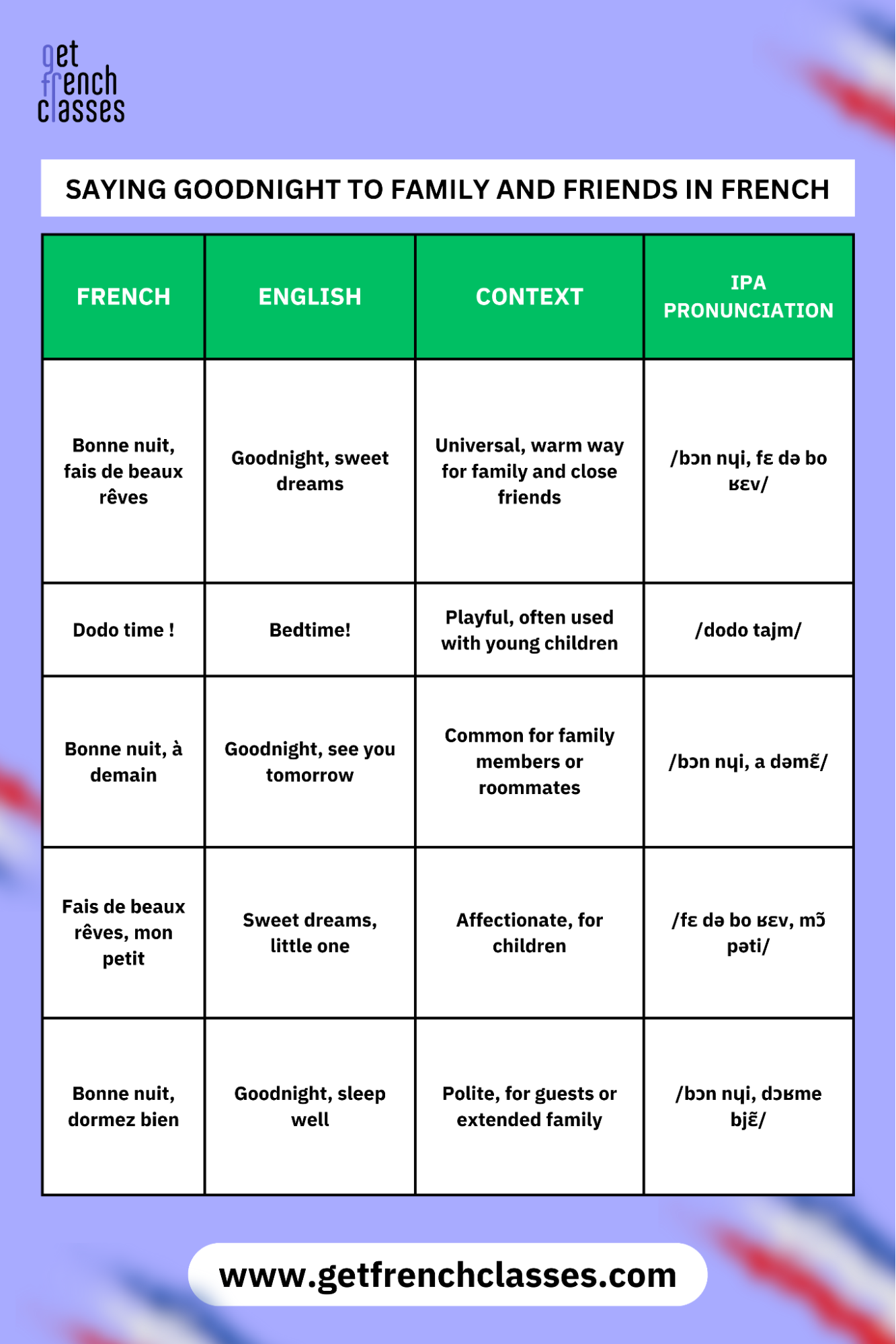
Ready to wrap up the day with your loved ones, French style? Whether it's tucking in the kids, saying night-night to your bestie, or ending a family dinner, we've got you covered. Let's dive into these warm and fuzzy French goodnights! Among these phrases, two expressions are designed for children good night.
| French | English | Context | IPA Pronunciation |
|---|---|---|---|
| Bonne nuit, fais de beaux rêves | Goodnight, sweet dreams | Universal, warm way for family and close friends | /bɔn nɥi, fɛ də bo ʁɛv/ |
| Dodo time ! | Bedtime! | Playful, often used with young children | /dodo tajm/ |
| Bonne nuit, à demain | Goodnight, see you tomorrow | Common for family members or roommates | /bɔn nɥi, a dəmɛ̃/ |
| Fais de beaux rêves, mon petit | Sweet dreams, little one | Affectionate, for children | /fɛ də bo ʁɛv, mɔ̃ pəti/ |
| Bonne nuit, dormez bien | Goodnight, sleep well | Polite, for guests or extended family | /bɔn nɥi, dɔʁme bjɛ̃/ |
Examples and explanations of nuances:
-
Tucking in your child: Allez, c'est l'heure du dodo ! Bonne nuit mon petit chou, fais de beaux rêves. Come on, it's bedtime! Goodnight my little cabbage, sweet dreams. "Dodo" is a childish term for sleep, and "mon petit chou" (literally "my little cabbage") is a super cute term of endearment for kids. It's the equivalent of saying "sweetie pie" in English.
-
Ending a call with your best friend: Bon, je vais me coucher. Bonne nuit ma poule, à demain pour notre café ! Well, I'm going to bed. Goodnight my chicken, see you tomorrow for our coffee! "Ma poule" (my chicken) is a friendly, affectionate term among close friends. It might sound weird in English, but it's totally normal and sweet in French language!
-
Saying good night in french to your sibling: Je monte me coucher. Bonne nuit frangin, éteins la télé quand tu montes ! I'm going up to bed. Goodnight bro, turn off the TV when you come up! "Frangin" is a casual way to say brother, similar to "bro" in English. The casual instruction at the end is typical of sibling interactions.
Va te reposer, frérot ! (Get some rest, bro! )
"Frérot" is another informal term for "brother," similar to "frangin" but with an added sense of affection or endearment, like "little bro" or "buddy" in English. It is typically reserved for familiar, relaxed conversations.
-
To house guests: Voilà votre chambre. Bonne nuit, dormez bien, et n'hésitez pas si vous avez besoin de quoi que ce soit. Here's your room. Goodnight, sleep well, and don't hesitate if you need anything. This is more formal than you'd be with immediate family, but still warm. The offer of help is a typical courtesy to guests.
-
At the end of a family dinner: Merci pour cette belle soirée. Bonne nuit tout le monde, faites de beaux rêves ! Thanks for this lovely evening. Goodnight everyone, sweet dreams! This is a warm, inclusive way to say good night in french to a group. The thanks at the beginning is a nice touch often used in family gatherings.
Remember, with family and friends, it's all about the warmth and familiarity. Don't be shy with those terms of endearment – the French love them!
And a little "bisou" (kiss) or "câlin" (hug) often goes hand in hand with these goodnights. Sweet dreams, in french having as literal translation "beaux rêves", or as we say, faites de beaux rêves !
Regional variations of goodnight in French-speaking countries
Isn't it fascinating how one language can sound so different across the globe? These variations aren't just about the words – they're little windows into the culture and history of each region.
Whether it's the German influence in Switzerland, the African rhythms of Côte d'Ivoire, or the unique blend of French and English in Louisiana, each goodnight carries its own special flavor.
| Region | French Expression | English Translation | Context | IPA Pronunciation |
|---|---|---|---|---|
| Quebec, Canada | Bonne nuit, fais de beaux rêves | Goodnight, have sweet dreams | Standard Quebecois goodnight | /bɔn nɥi, fɛ də bo ʁɛv/ |
| Belgium | Bonne nuit, dormez bien | Goodnight, sleep well | Common in Belgian French | /bɔn nɥi, dɔʁme bjɛ̃/ |
| Switzerland | Bonne nuit, schlofe guet | Goodnight, sleep well | Mix of French and Swiss German | /bɔn nɥi, ʃlɔfə ɡuət/ |
| Côte d'Ivoire | Bonne nuit, dormez bien-o | Goodnight, sleep well | With typical Ivorian suffix '-o' | /bɔn nɥi, dɔʁme bjɛ̃ o/ |
| Louisiana, USA | Bon soir, fais de bon rêves | Good evening, have good dreams | Cajun French variant | /bɔ̃ swaʁ, fɛ də bɔ̃ ʁɛv/ |
-
In a Montreal home: Bonne nuit, fais de beaux rêves, là! Goodnight, have sweet dreams, eh! The addition of "là" at the end is very Quebecois. It's like adding "eh" in Canadian English, giving it a distinct local flavor.
-
At a Brussels dinner party: Allez, bonne nuit tout le monde. Dormez bien, à la prochaine! Well then, goodnight everyone. Sleep well, until next time! "Allez" is commonly used in Belgian French to transition or conclude. "À la prochaine" is a friendly way of saying "see you next time".
-
In a Swiss household: "Bonne nuit, schlofe guet. N'oublie pas ta séance de demain." Goodnight, sleep well. Don't forget your meeting tomorrow. The mix of French and Swiss German is common in some parts of Switzerland, reflecting the country's multilingual nature.
-
On a phone call in Abidjan: Bon, je te laisse. Bonne nuit-o, on se capte demain! Well, I'll let you go. Goodnight, catch you tomorrow! The "-o" suffix and "on se capte" (we'll catch up) are typical of Ivorian French, giving it a distinct West African flair.
-
In a Cajun household in Louisiana: Bon soir, cher. Fais de bon rêves et passe une bonne nuit, yeah. Good evening, dear. Have good dreams and have a good night, yeah.
Cajun French often uses "bon soir" where other dialects might use "bonne nuit". The "yeah" at the end is a typical Cajun addition, showing the influence of English.
French goodnight phrases for specific situations
Life throws all sorts of scenarios our way, and each one might call for a different way to say good night in french. Whether you're leaving a party, tucking in kids, or wrapping up a business call, we've got you covered with the perfect French phrase. Let's dive in!
| Situation | French Phrase | English Translation | Context | IPA Pronunciation |
|---|---|---|---|---|
| Leaving a party | Bonne fin de soirée à tous ! | Have a good rest of the evening, everyone! | Polite way to say goodbye when others are staying | /bɔn fɛ̃ də swaʁe a tu/ |
| Tucking in children | Fais de beaux rêves, mon petit ange | Sweet dreams, my little angel | Affectionate goodnight for young children | /fɛ də bo ʁɛv, mɔ̃ pəti ɑ̃ʒ/ |
| After a business dinner | Bonne nuit et merci pour cette agréable soirée | Goodnight and thank you for this pleasant evening | Formal, appreciative goodnight | /bɔn nɥi e mɛʁsi puʁ sɛt aɡʁeabl swaʁe/ |
| To a sick friend | Bonne nuit, repose-toi bien et guéris vite | Goodnight, rest well and get better soon | Caring goodnight for someone who's ill | /bɔn nɥi, ʁəpoz twa bjɛ̃ e ɡeʁi vit/ |
| After a date | Bonne nuit, j'ai passé une merveilleuse soirée | Goodnight, I had a wonderful evening | Romantic, appreciative goodnight | /bɔn nɥi, ʒe pase yn mɛʁvɛjøz swaʁe/ |
-
At the end of a house party: Merci pour l'invitation, c'était génial ! Bonne fin de soirée à tous, ne faites pas trop de bruit pour les voisins ! Thanks for the invitation, it was great! Have a good rest of the evening everyone, don't make too much noise for the neighbors! "Bonne fin de soirée" is perfect when you're leaving but the party continues. The comment about neighbors adds a touch of considerate humor.
-
Putting a child to bed after a story: Et ils vécurent heureux... Allez, c'est l'heure d'aller se reposer maintenant. Fais de beaux rêves, mon petit ange. N'oublie pas de compter les moutons si tu n'arrives pas à t'endormir. And they lived happily ever after... Come on, it's time to sleep now. Sweet dreams, my little angel. Don't forget to count sheep if you can't fall asleep. The transition from story to bedtime is smooth and affectionate. The sheep-counting suggestion adds a playful, caring touch.
-
Concluding a business dinner: Je vous remercie pour cette soirée fort instructive. Bonne nuit et merci pour cette agréable soirée. J'ai hâte de poursuivre notre discussion lors de notre prochaine rencontre. Thank you for this very informative evening. Goodnight and thank you for this pleasant evening. I look forward to continuing our discussion at our next meeting. This combines gratitude, a formal goodnight, and a hint at future business interactions, maintaining professionalism while ending on a positive note.
-
Calling a sick friend before bed: Je ne veux pas te déranger longtemps. Bonne nuit, repose-toi bien et guéris vite. N'hésite pas à m'appeler si tu as besoin de quoi que ce soit. I don't want to disturb you for long. Goodnight, rest well and get better soon. Don't hesitate to call me if you need anything. This shows consideration for their condition, offers support, and keeps the conversation brief to allow rest.
-
After a romantic dinner date: Bonne nuit, j'ai passé une merveilleuse soirée. Ton sourire va illuminer mes rêves. À très bientôt, j'espère. Goodnight, I had a wonderful evening. Your smile will light up my dreams. See you very soon, I hope. This combines appreciation for the date with a romantic compliment and a subtle hint at wanting to meet again, perfect for early stages of dating.
Remember, the key to nailing these situational goodnights is to read the room. The phrases themselves are great, but delivering them with the right tone and body language is what really makes them shine.
Goodnight expressions in French used in texting and social media by Gen Z
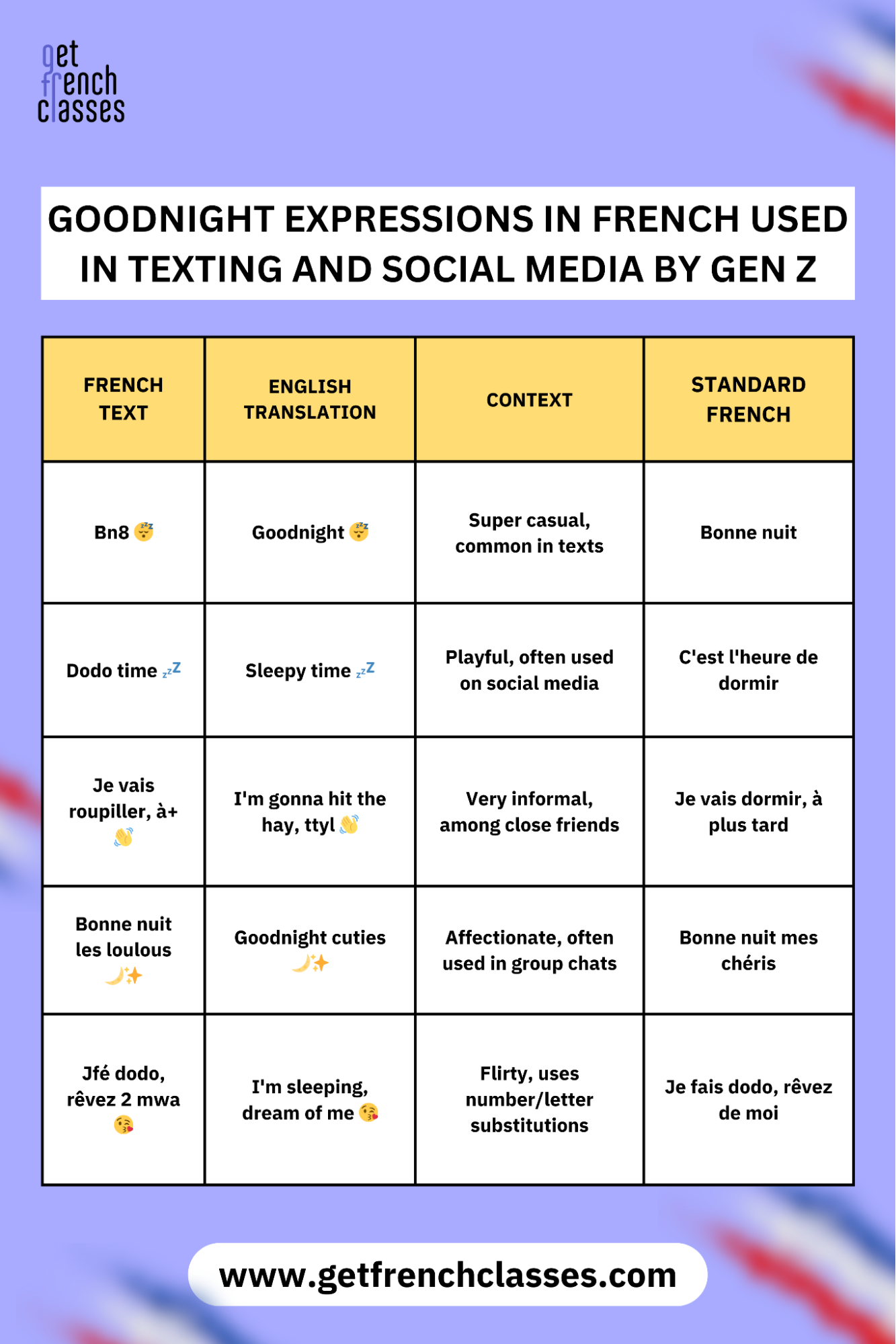
Ready to say goodnight like a true French teen? Forget what you learned in textbooks - we're diving into the wild world of Gen Z texting lingo. Let's learn french Gen Z way. Prepare for abbreviations, emojis, and slang that might make your French teacher raise an eyebrow!
| French Text | English Translation | Context | Standard French |
|---|---|---|---|
| Bn8 😴 | Goodnight 😴 | Super casual, common in texts | Bonne nuit |
| Dodo time 💤 | Sleepy time 💤 | Playful, often used on social media | C'est l'heure de dormir |
| Je vais roupiller, à+ 👋 | I'm gonna hit the hay, ttyl 👋 | Very informal, among close friends | Je vais dormir, à plus tard |
| Bonne nuit les loulous 🌙✨ | Goodnight cuties 🌙✨ | Affectionate, often used in group chats | Bonne nuit mes chéris |
| Jfé dodo, rêvez 2 mwa 😘 | I'm sleeping, dream of me 😘 | Flirty, uses number/letter substitutions | Je fais dodo, rêvez de moi |
-
In a late-night group chat: Bon les gars, jdois vous lâcher. Bn8 la team! 😴✌️ Alright guys, gotta leave you. Gn8 team! 😴✌️ "Les gars" is used regardless of the group's gender. "Lâcher" (literally "to drop") means "to leave" in this context. "La team" is an Anglicism commonly used by French youth.
-
Posting on Instagram stories: Dodo time les BG, faites de beaux rêves 💤🌠 #nuit #fatiguée #needsleep Sleepy time, beautiful people, sweet dreams 💤🌠 #night #tired #needsleep "BG" stands for "beaux gosses" (beautiful people). Hashtags are often in English or Franglais (French-English mix).
-
Texting a crush: Jvais roupiller mais jvoulais te dire bonne nuit avant 😊 Fais d'beaux rêves! I'm gonna hit the hay but wanted to say goodnight first 😊 Sweet dreams! "Jvais" and "jvoulais" are contracted forms of "je vais" and "je voulais". "Roupiller" is slang for sleeping.
-
In a family WhatsApp group: Bonne nuit les loulous! Dormez bien et à demain pour le brunch 🥐☕️ Goodnight cuties! Sleep well and see you tomorrow for brunch 🥐☕️ "Loulous" is an affectionate term, softer than "cuties". The croissant and coffee emojis hint at the brunch plans.
-
Snapchatting a friend: Chui HS, jfé dodo. Rêve pas trop d'mwa mdr 😜 À dem! I'm beat, I'm sleeping. Don't dream too much about me lol 😜 See ya tmr! "Chui" is a very informal "je suis". "HS" stands for "hors service" (out of order). "mdr" is the French "lol" (literally "mort de rire" - dying of laughter).
A few key things to remember:
-
Numbers often replace syllables: "2" for "de", "8" for "uit".
-
Vowels? Who needs 'em! "Jfé" instead of "je fais" is totally normal.
-
Emojis aren't just cute, they're part of the message. They can replace words or add tone.
-
English words and expressions are liberally sprinkled in, especially in hashtags.
-
The shorter, the better. Why say "à demain" when "à dem" will do?
Beyond goodnight: French phrases for pleasant dreams and restful sleep
In French culture, wishing someone a good night's sleep goes beyond mere politeness – it's a way of showing care and consideration.
French language native speakers have a deep appreciation for the restorative power of sleep and the beauty of dreams. That's why you'll often hear these phrases used not just at bedtime, but also when saying goodbye in the evening or ending a late-night call.
| French Phrase | English Translation | Context | IPA Pronunciation |
|---|---|---|---|
| Fais de beaux rêves | Have beautiful dreams | Universal, warm wish for pleasant dreams | /fɛ də bo ʁɛv/ |
| Dors comme un loir | Sleep like a dormouse (deep sleep) | Wishing someone to sleep deeply | /dɔʁ kɔm œ̃ lwaʁ/ |
| Que ta nuit soit douce | May your night be gentle | Poetic wish for a peaceful night | /kə ta nɥi swa dus/ |
| Passe une nuit reposante | Have a restful night | Wishing someone a recuperative sleep | /pas yn nɥi ʁəpozɑ̃t/ |
| Je te souhaite un sommeil réparateur | I wish you a restorative sleep | For someone who needs to recharge | /ʒə tə swɛt œ̃ sɔmɛj ʁepaʁatœʁ/ |
Now, let's see how these phrases come to life in different situations:
-
To a friend who's been stressed: " Allez, déconnecte-toi et dors comme un loir. Tu as besoin de récupérer ! Come on, disconnect and sleep like a dormouse. You need to recover! "Dormir comme un loir" is a common expression for sleeping deeply. It's like saying "sleep like a log" in English.
-
Saying goodnight to your partner: " Bonne nuit, mon amour. Que ta nuit soit douce et remplie de beaux rêves de nous. Goodnight, my love. May your night be gentle and filled with beautiful dreams of us. This combines several elements for a romantic and poetic goodnight wish.
-
To someone recovering from illness: " Repose-toi bien. Je te souhaite un sommeil réparateur pour que tu retrouves vite ta forme. Rest well. I wish you a restorative sleep so you can quickly regain your strength. "Sommeil réparateur" emphasizes the healing power of sleep, showing care for the person's health.
-
After a long day of work or study: " Tu as bien travaillé aujourd'hui. Passe une nuit reposante, tu l'as bien mérité ! You worked hard today. Have a restful night, you've earned it! This acknowledges the person's efforts and emphasizes the importance of rest after hard work.
-
To a child afraid of nightmares: " N'aie pas peur, mon petit. Fais de beaux rêves remplis de licornes et d'arcs-en-ciel. Don't be afraid, little one. Have beautiful dreams filled with unicorns and rainbows. This uses "fais de beaux rêves" with specific, positive imagery to comfort a child.
Here are a few more tips to remember:
-
These phrases can be mixed and matched. Don't be afraid to get creative!
-
The tone of your voice matters as much as the words. Speak softly and warmly for maximum effect.
-
For close friends and family, you can add terms of endearment like "mon chou" (my sweet) or "ma puce" (my flea – sounds weird in English but it's sweet in French!)
-
If you're texting, feel free to add some appropriate emojis like 😴💤🌙 to emphasize your point.
So there you have it! With these phrases in your linguistic toolbox, you're all set to wish sweet dreams in french and restful nights in true French style. Alors, fais de beaux rêves et à demain !
How to say goodnight in French FAQ
What's the difference between "Bonne nuit" and "Bonsoir"?
Ah, the classic confusion! Here's the scoop: "Bonsoir" is like saying "Good evening." You use it as a greeting when you arrive somewhere in the evening, or as a farewell earlier in the night when people aren't heading to bed yet.
"Bonne nuit," on the other hand, means "Goodnight" and is specifically for when someone is going to sleep. You wouldn't use it when arriving at a party at 8 PM, but it's perfect for tucking in the kids or ending a late-night call.
Pro tip : If you're leaving a gathering and others are staying, stick with "Bonsoir" even if it's late. "Bonne nuit" might sound like you're sending everyone to bed!
How do I respond when someone says goodnight to me in French?
Easy peasy! Here are a few ways to respond:
-
Echo back : If someone says "Bonne nuit," you can simply reply "Bonne nuit" too.
-
Add a little extra : "Bonne nuit à toi aussi" (Goodnight to you too) or "Toi aussi" (You too).
-
Wish them sweet dreams : "Fais de beaux rêves" (Have beautiful dreams).
-
For close friends/family : "Dors bien" (Sleep well) or "À demain" (See you tomorrow).
Remember, in French culture, it's common to 'mirror' the level of formality. If they use "tu" (informal you), you can too. If they stick with "vous" (formal you), follow suit.
Are there any French bedtime traditions I should know about?
Oh, absolutely! Here are a few charming French bedtime customs:
-
" Le bisou du soir " ( The evening kiss ): It's common for family members to exchange a kiss on each cheek before bed.
-
Bedtime stories : "Une histoire avant de dormir" is a cherished tradition. Classic French tales like "Le Petit Prince" are popular choices.
-
" Faire un câlin " ( Give a hug ): A warm hug before bed is common in many French families.
-
" Bordage ": This is the ritual of tucking in children, often accompanied by a little chat about their day.
-
" Verre d'eau ": Leaving a glass of water by the bedside is a common practice.

These traditions can vary by family and region, but they all contribute to the French emphasis on "le rituel du coucher" (the bedtime ritual).
How can I make my French goodnights sound more natural?
Great question! Here are some tips to sound more like a native:
-
: Add "Allez" before your goodnight for a casual touch. "Allez, bonne nuit!"
-
Incorporate common phrases : "Fais de beaux rêves" (Sweet dreams) or "Dors bien" (Sleep well) can make your goodnights more colorful.
-
Add terms of endearment : For close relations, use "mon chéri/ma chérie" or "mon cœur."
-
Mind your tone : French goodnights are often said softly and warmly.
-
Use context-appropriate expressions : "Ne fais pas de bruit en rentrant" (Don't make noise when you come in) if someone's coming home late.
-
Embrace the French 'R' : Practice that throaty 'R' in "Bonne nuit" for authentic pronunciation.
Remember, natural speech comes with practice. Don't be afraid to mimic native speakers!
Are there any French superstitions or sayings related to nighttime?
Oh là là, the French love their sayings! Here are a few nighttime-related ones:
-
" Qui dort dîne " ( He who sleeps, dines ): Meaning sleep is as vital as food.
-
" La nuit porte conseil " ( Night brings advice ): Similar to "Sleep on it."
-
" Dormir sur ses deux oreilles " ( To sleep on both ears ): To sleep soundly without worry.
-
" Entre chien et loup " ( Between dog and wolf ): Refers to twilight, when it's hard to distinguish things.
-
Superstition : Some believe it's bad luck to whistle at night as it might attract the devil!
These sayings add a bit of cultural flavor to your nighttime chats. Use them to impress your French friends – they'll be tickled that you know these expressions!
I want to reply to this question "how do you say goodnight in french?
